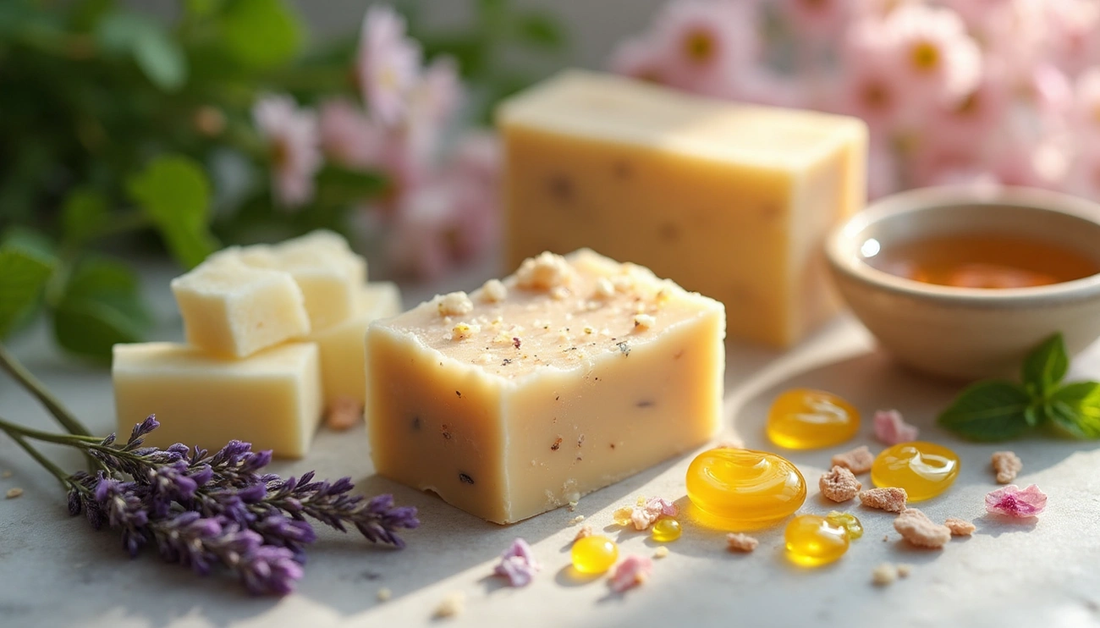
Why Organic Soaps Are Better: The Hidden Truth Your Skin Needs
Hey there! If you take a closer look at those commercial "soap" labels, you might notice they often use terms like "cleansing bar" or "beauty bar" instead of just plain old "soap." This isn't just a clever marketing trick—it's actually a legal requirement! You see, commercial cleaning bars are made with synthetic detergents that whip up a ton of suds but can be a bit harsh on your skin. Plus, these mass-produced products usually contain cheap fillers, artificial fragrances, preservatives, colors, and those harsh detergents we mentioned. One of the most concerning things is that manufacturers often remove natural glycerin—a super important moisturizer—to sell it separately. This leaves your skin feeling a bit stripped of its natural protection.
The cold process method explained
Now, let’s chat about the traditional cold process soapmaking! This method is all about preserving those natural ingredients through careful temperature control and curing. During the curing process, saponification wraps up, water evaporates, and the soap develops its gentle, effective structure. And the best part? When made correctly, there’s no lye left in the final product!
Why FDA doesn't classify most soaps as real soap?
So, why doesn’t the FDA consider most soaps to be real soap? Well, they only classify products as "soap" if they:
- Contain mainly alkali salts of fatty acids
- Clean solely through these salts
- Market exclusively as soap
Most commercial products don’t fit this definition because they make additional claims. But don’t worry! Natural soapmakers stick to traditional methods, crafting products that clean through the gentle action of fatty acid chains.
Natural soaps feature nourishing oils like olive (for antioxidants), coconut (for antimicrobial benefits), shea butter (for vitamins A and E), cocoa butter (for softness), and avocado oil (for vitamins A, B, D, E). Most makers prefer unrefined oils for maximum nutrients.
No synthetic fragrances or preservatives
Unlike commercial soaps, natural versions skip synthetic fragrances, artificial colors, chemical preservatives, and foam boosters.
Natural soaps benefit sensitive skin by avoiding harsh chemicals.
Benefits of essential oils and botanicals
Essential oils like lavender, tea tree, eucalyptus, and rosemary provide natural fragrance and therapeutic skin benefits.
Beyond essential oils, natural soaps include herbs, flowers, and seeds for gentle exfoliation and therapeutic benefits. Ingredients like oatmeal, honey, and goat milk target specific skin needs.
Environmental and Ethical Advantages
- Biodegradable and eco-friendly Natural natural soaps break down into harmless components within six months, minimizing environmental impact. However, proper disposal away from water sources is essential.
- Sustainable ingredient sourcing Leading natural soap brands partner directly with small farmers for sustainable ingredient sourcing.
- Plastic-free and recyclable packaging Companies use eco-friendly packaging like recyclable cardboard, paper wraps, aluminum tins, and glass jars to reduce landfill waste.
- Cruelty-free and fair trade practices These soaps avoid animal testing while ensuring fair compensation for farmers. Fair trade premiums support community projects like schools and healthcare. Companies like Dr. Bronner's invest in social activism, showing that business can drive positive change.
The Real Value Behind the Price Tag
- Why natural soap costs more The natural soap market, valued at $385.1 million in 2023, commands higher prices due to premium ingredients, small-batch production, and extensive curing time.
- Longer-lasting and concentrated formula Natural soaps last longer than commercial ones since they contain mostly oils and butters instead of water. Proper storage using a draining soap dish extends their lifespan further.
- Avoiding the need for extra skincare products Unlike commercial soaps that remove glycerin, natural soaps retain natural moisturizers. This means you won't need additional lotions or specialized treatments, ultimately saving money and simplifying skincare.
Natural soap represents a return to authentic skincare, using natural ingredients that work with your skin. While the initial cost may be higher than commercial soaps, the concentrated formula and elimination of extra moisturizers provide better long-term value. As more people understand true soap-making, they recognize natural soap as the healthier choice for both body and planet.
